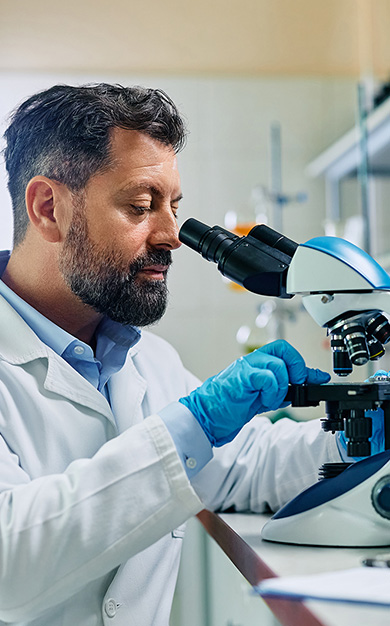9 Tips for Healthy Living With an Eye Disease
Written By: BrightFocus Editorial Staff
Written By: BrightFocus Editorial Staff

Healthy living benefits overall physical well-being, which helps promote overall eye health. Learn more about how to maintain a healthy lifestyle while living with an eye disease.
A healthy lifestyle that includes regular exercise and a nutritious diet are both extremely important tools for maintaining overall well-being, especially for people with glaucoma or macular degeneration. Both exercise and a healthy diet are important for overall health, but they also promote good eye health.
Foods that contain carotenoids, antioxidants, vitamins A and D, zinc, and omega-3 fatty acids can help prevent further degeneration of the eyes. Although these nutrients cannot completely reverse the effects of glaucoma, they can help prevent its progress. Carotenoids, especially lutein and zeaxanthin, are found in dark green, yellow, and orange fruits and vegetables, including: spinach, okra, orange peppers, collard greens, kale, egg yolks, mango, and sweet potatoes.
Exercise can help lower eye pressure and helps blood flow to the retina and optic nerve. Aim for 20 to 30 minutes of aerobic activity, such as walking, swimming, or even yard work. However, keep in mind that some aerobic activity may increase pressure, so be sure to contact your physician before beginning any exercise program.
A healthy diet and exercise regime lowers the chance of developing glaucoma by decreasing the risk of developing diabetes and becoming overweight.
If blood pressure levels are low, it becomes difficult for blood flow to adequately reach the eye, which causes oxygen depletion and nutrient deficiency. High blood pressure results in optic nerve damage, leading to glaucoma and vision loss. An eye physician can detect high blood pressure during an eye exam and determine an appropriate treatment.
Smoking increases blood pressure and inflammation in the eye, which leads to increased chance of cataracts and diabetes. Both cataracts and diabetes are risk factors for glaucoma. Smoking also increases the risk for macular degeneration and other eye conditions.
Wear wide-brimmed hats and high quality sunglasses that have 99% to 100% UVA and UVB protection.
Comprehensive eye exams detect early warning signs of degeneration. If you have glaucoma, make follow-up visits as recommended.
Take medication as directed by your eye doctor, especially if you have glaucoma.
Eating a diet that is high in whole grains, fruits, vegetables and that is low in sugar and fat can reduce the incidence of many chronic diseases, and researchers are continuing to study whether these dietary modifications are also applicable to glaucoma.
BrightFocus Foundation is a premier global nonprofit funder of research to defeat Alzheimer’s, macular degeneration, and glaucoma. Since its inception more than 50 years ago, BrightFocus and its flagship research programs—Alzheimer’s Disease Research, Macular Degeneration Research, and National Glaucoma Research—has awarded more than $300 million in research grants to scientists around the world, catalyzing thousands of scientific breakthroughs, life-enhancing treatments, and diagnostic tools. We also share the latest research findings, expert information, and resources to empower the millions impacted by these devastating diseases. Learn more at brightfocus.org.
Disclaimer: The information provided here is a public service of BrightFocus Foundation and is not intended to constitute medical advice. Please consult your physician for personalized medical, dietary, and/or exercise advice. Any medications or supplements should only be taken under medical supervision. BrightFocus Foundation does not endorse any medical products or therapies.
Help Fight Macular Degeneration and Save Sight
Your donation helps fund critical research to bring us closer to a cure for this sight-stealing disease and provide vital information to the public.
Donate Today